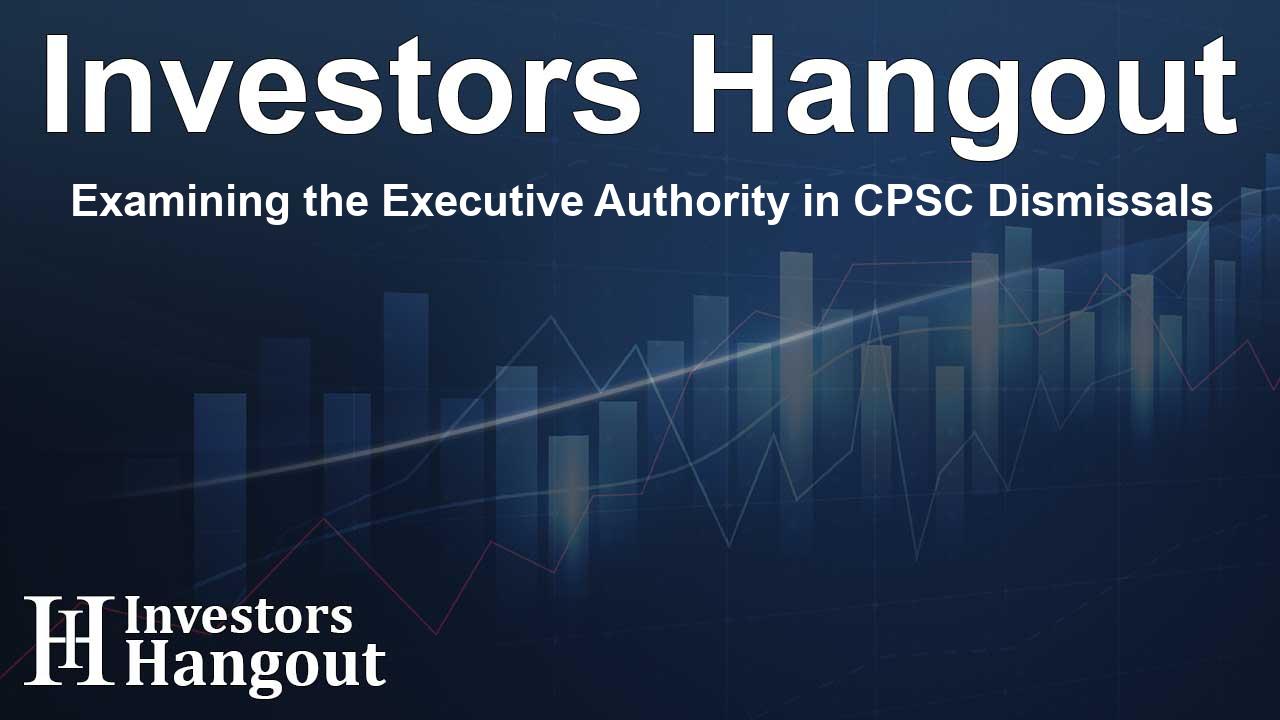Examining the Executive Authority in CPSC Dismissals

NCLA Challenges District Court Ruling on Presidential Authority
The New Civil Liberties Alliance (NCLA) has taken a significant legal stand regarding the powers of the President, submitting an amicus curiae brief in a case concerning the removal of Consumer Product Safety Commission (CPSC) commissioners. This case, Boyle v. Trump, seeks to overturn a decision made by a Maryland district court that deemed President Trump's termination of three CPSC commissioners as unlawful. The commissioners in question were Mary Boyle, Alexander Hoehn-Saric, and Richard Trumka, Jr., whose brief reinstatement by the court was overturned by the Supreme Court's decision to stay that ruling last July.
The Core Constitutional Debate
The fundamental issue at play is the interpretation of executive power as detailed in the U.S. Constitution. NCLA argues that executive authority is vested completely in the President, giving him the exclusive right to appoint, supervise, and remove federal officers who carry out executive responsibilities. Unlike appointment powers, which may be subject to certain limitations, the removal authority granted to the President is absolute. This interpretation aligns with the Supreme Court's ruling in Seila Law v. Consumer Financial Protection Bureau, reinforcing the necessity for the President to possess the authority to both supervise and remove executive agents.
Control and Accountability
The ability to remove these officials is vital for maintaining control over delegated powers. NCLA emphasizes the President's role in ensuring that appointees adhere to his policy priorities. The reinstatement of Boyle, Hoehn-Saric, and Trumka demonstrated their attempts to steer the commission's agenda in ways contrary to the President’s policies, evidencing why the removal authority is essential for the effectiveness of the Executive Branch.
Statements from NCLA Legal Team
Prominent members of the NCLA have spoken out regarding the implications of this case. Margot Cleveland, Of Counsel at NCLA, stated, "The Supreme Court has consistently intervened to uphold President Trump's constitutional authorities against lower court overreach. The Fourth Circuit has the chance to clarify that it is the President who must guide the Executive Branch, not unelected officials."
Legal Perspective on Termination
Senior Litigation Counsel, John Vecchione, remarked on the lack of authority at the district court level to reinstate a federal officer who has been terminated. He underscored that the actions taken by the fired commissioners to challenge the President’s appointees exemplify exactly why such reinstatements should not occur.
The Essence of Executive Authority
Mark Chenoweth, President of NCLA, highlighted the centrality of the President’s prerogative. He stated, "The American people chose Trump as their leader—not the commissioners! Their resistance to the President’s firing is a misstep. The legal precedent of Humphrey's Executor safeguards officials from dismissal only if they do not exercise executive power, which these three did." This secures a crucial understanding of the balance of power within the federal system.
About the New Civil Liberties Alliance
NCLA is dedicated to defending civil liberties against the encroachment of governmental authority, particularly by administrative overreach. This nonpartisan, nonprofit group, founded by legal scholar Philip Hamburger, works tirelessly to protect constitutional freedoms through litigation and advocacy aimed at promoting and restoring the rights of individuals against state and federal agencies that may infringe upon these rights.
Frequently Asked Questions
What is the main issue in the NCLA's brief?
The NCLA's brief addresses President Trump’s constitutional authority to fire commissioners of the CPSC and challenges a ruling that deemed such actions unlawful.
Who are the CPSC commissioners involved in the case?
The commissioners involved are Mary Boyle, Alexander Hoehn-Saric, and Richard Trumka, Jr.
What does the NCLA argue regarding executive power?
The NCLA contends that the President has absolute authority to oversee and remove federal officers, a power not restricted by the Constitution.
What was the outcome of the district court's ruling?
The district court ruled against the President, but the Supreme Court later stayed this decision, allowing the President's authority to remove the commissioners to stand.
How does this case reflect on presidential powers?
This case emphasizes the importance of executive power and accountability in the administration, illustrating the President's responsibility to ensure that appointees align with his policies.
About The Author
Contact Logan Wright privately here. Or send an email with ATTN: Logan Wright as the subject to contact@investorshangout.com.
About Investors Hangout
Investors Hangout is a leading online stock forum for financial discussion and learning, offering a wide range of free tools and resources. It draws in traders of all levels, who exchange market knowledge, investigate trading tactics, and keep an eye on industry developments in real time. Featuring financial articles, stock message boards, quotes, charts, company profiles, and live news updates. Through cooperative learning and a wealth of informational resources, it helps users from novices creating their first portfolios to experts honing their techniques. Join Investors Hangout today: https://investorshangout.com/
The content of this article is based on factual, publicly available information and does not represent legal, financial, or investment advice. Investors Hangout does not offer financial advice, and the author is not a licensed financial advisor. Consult a qualified advisor before making any financial or investment decisions based on this article. This article should not be considered advice to purchase, sell, or hold any securities or other investments. If any of the material provided here is inaccurate, please contact us for corrections.
